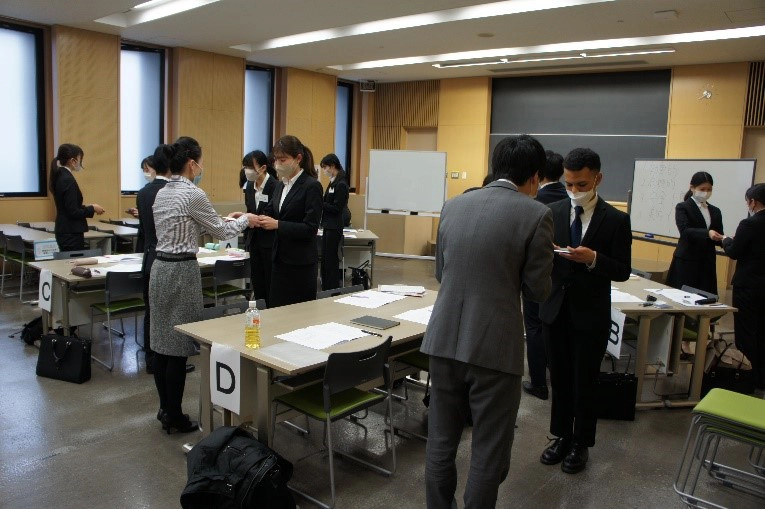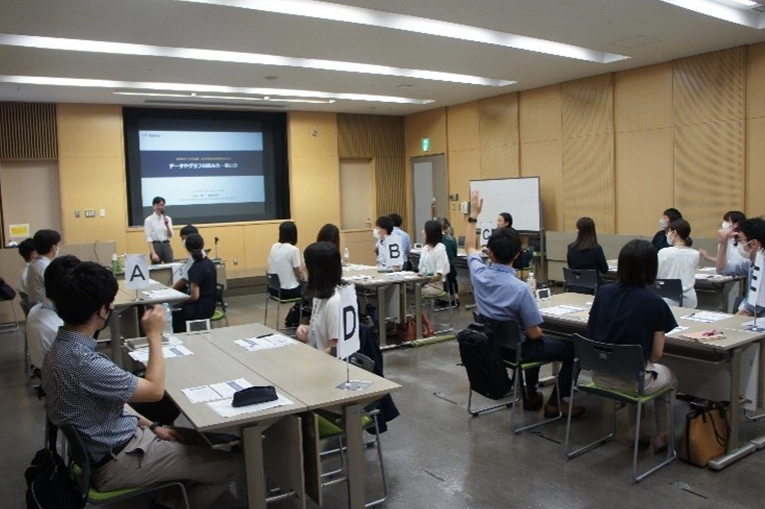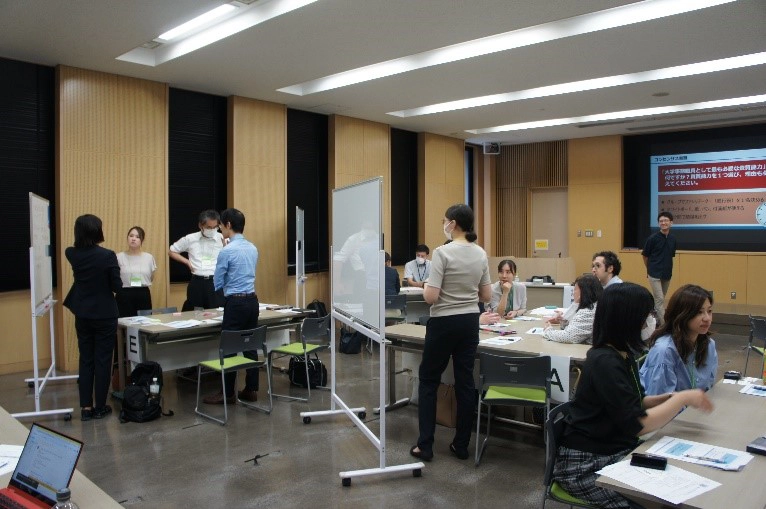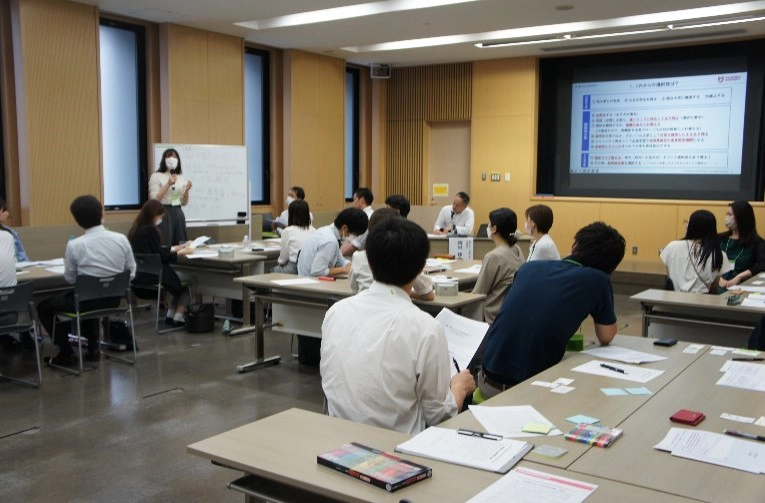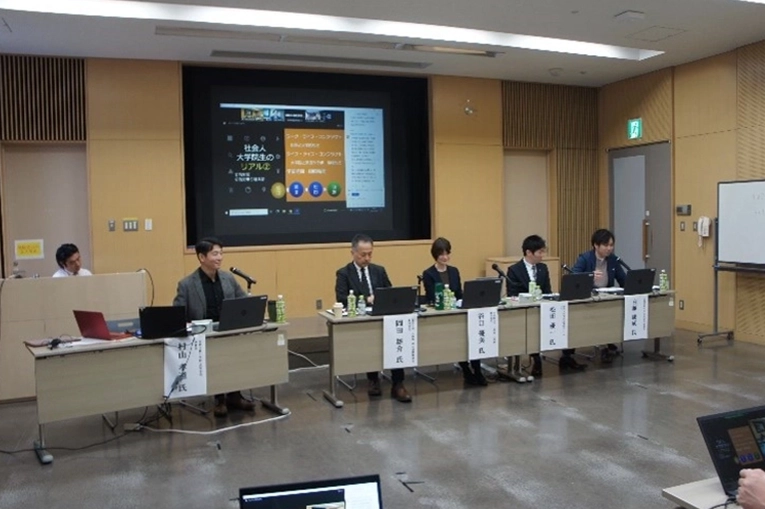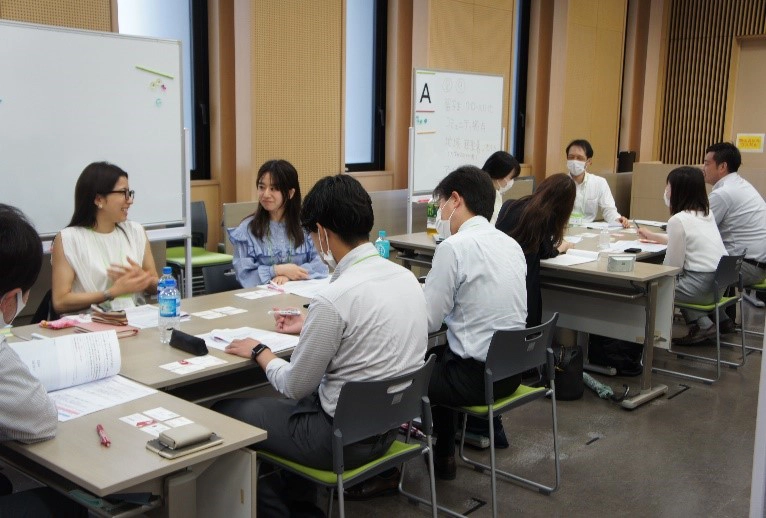Business overview
As education and research at higher education institutions become more sophisticated and complex, SD became mandatory in 2017, and it is hoped that faculty and staff will further improve their qualifications and promote faculty-staff collaboration.
Furthermore, the environment surrounding higher education institutions is changing rapidly, and university staff are increasingly being required to acquire broad knowledge and advanced expertise.
The SD Joint Training Program is a project aimed at reducing expenses at member universities by leveraging economies of scale, with the aim of improving staff capabilities and streamlining and enhancing university operations.
Please also use it as an opportunity to exchange information and build networks across universities.
Event Overview
| program | Date and time | Capacity |
| The more you know about business etiquette, the more you’ll understand | March 23rd (Thursday), March 24th (Friday), May 12th (Friday) 13:00-17:00 |
20 people each |
| Higher Education Situation for University Staff (Basics) | Wednesday, June 14th 13 :00-16:00 |
20 people |
| Future University Staff “URA” (Basics) | Wednesday, July 12th 13 :00-16:00 |
20 people |
| How to read and use data and graphs | Wednesday, August 9th 13:00-16:00 |
20 people |
| Project facilitation for task progress | Wednesday, September 20th 13 :00-17:00 |
20 people |
| Building a safe team: Mental health and line care training | November 24th (Friday) 13:00-16:00 |
20 people |
| Careers of University Staff: Graduate School and Beyond | Wednesday, December 6th 13:00-16:00 |
40 people |
■ Business etiquette that becomes easier to understand the more you know
1. Training Overview
- Students will learn the necessary knowledge, business etiquette, and basic work procedures for university staff, and acquire the ability to adapt to their duties and workplace.
- It starts with understanding that manners are an important technique for getting work done. If you think of manners as a technique for smoothly progressing your work, you must consider how you appear to others. You will also thoroughly learn the various “patterns” of manners, including appearance and greetings, how to greet customers, how to make phone calls, and how to use honorific language.
- Most of the problems that young employees encounter at their new workplaces are related to speaking.
For example, not reporting, not using honorific language, not answering the phone, making negative comments, etc.
In other words, we will teach you how to approach “speaking like a working adult,” which is important when training new and young employees.
2. Key points for training management
- By establishing a flow from lectures (instilling knowledge) to exercises (practice) for each topic, we will achieve “input ⇒ strengthening practical ability through output.” It will also help students understand that understanding does not necessarily mean they can put it into practice.
- Lectures, exercises, and instructor comments are incorporated at key points to keep students focused and motivated.
- Date and Time
- May 12, 2023 (Friday) 13:00-17:00
- venue
- Campus Plaza Kyoto
- Target audience
-
Young employees
(up to 5 years of service)Mid-career
(up to 10 years in the job)Experienced
(10+ years of service
and managers)○ *Newly hired employees (full-time, contract, contract, and temporary) and those not eligible can also participate.
- Capacity
- 20 people
- Participation fee
- Kyoto University Consortium member schools: 4,000 yen. Others: 10,000 yen.
* An invoice will be sent to you. Please transfer the payment to the specified account.
Payment deadline: Monday, May 8, 2023. - Training Overview
- Business Etiquette: The More You Know, the More You Understand Training Overview [Click here for details]
- Lecturer
- Speaking Education Center, Inc.
Mr. Mariya Fujiwara - Date and Time
- June 14, 2023 (Wednesday) 13:00-16:00
- venue
- Campus Plaza Kyoto
- Target audience
-
Young employees
(up to 5 years of service)Mid-career
(up to 10 years in the job)Experienced
(10+ years of service
and managers)○ ○ ○ - Capacity
- 20 people
- Participation fee
- Kyoto University Consortium member schools: 1,000 yen. Others: 4,000 yen.
*An invoice will be sent to you. Please transfer the payment to the specified account.
Payment deadline: Monday, June 12, 2023. - Training Overview
- Higher Education Situation (Basics) Training for University Staff [Click here for details]
- Lecturer
- Yusuke Okada,
Administrative Director, Admissions Department and High School-University Collaboration Promotion Office, Ryukoku University - Date and Time
- Wednesday, July 12, 2023 13:00-16:00
- venue
- Campus Plaza Kyoto
- Target audience
-
Young employees
(up to 5 years of service)Mid-career
(up to 10 years in the job)Experienced
(10+ years of service
and managers)○ ○ ○ - Capacity
- 20 people
- Participation fee
- Kyoto University Consortium member schools: 1,000 yen. Others: 4,000 yen.
* An invoice will be sent to you. Please transfer the payment to the specified account.
Payment deadline: Monday, July 10, 2023. - Training Overview
- Overview of training for future university staff “URA” (basic) [Click here for details]
- Lecturer
- Eriko Amano,
Research Administrator (
URA), Kyoto University Research Advancement Center ( KURA) - Acquire the knowledge and skills to interpret data and graphs from the perspective of a recipient of information.
- Acquire the knowledge and skills to appropriately and effectively provide (communicate and explain) the characteristics of the data obtained from the perspective of utilizing information.
- Understand the process and key points of preparatory work required to carry out data-based operations (data collection, preprocessing, accumulation/retention, etc.).
- Date and Time
- Wednesday, August 9, 2023 13:00-16:00
- venue
- Campus Plaza Kyoto
- Target Audience
- This course is aimed at people who are not good with numbers and data, or who are not used to handling data.
- Target audience
-
Young employees
(up to 5 years of service)Mid-career
(up to 10 years in the job)Experienced
(10+ years of service
and managers)○ *People who are not eligible can also participate.
- Capacity
- 20 people
- Participation fee
- Kyoto University Consortium member schools: 1,000 yen. Others: 4,000 yen.
* An invoice will be sent to you. Please transfer the payment to the specified account.
Payment deadline: Monday, August 7, 2023. - Training Overview
- How to read and use data and graphs Training outline [Click here for details]
- Lecturer
- Koichi Yamamoto,
Research and Intellectual Property Office, Research Promotion Department, Meiji University - Date and Time
- Wednesday, September 20, 2023 13:00-17:00
- venue
- Campus Plaza Kyoto
- Target audience
-
Young employees
(up to 5 years of service)Mid-career
(up to 10 years in the job)Experienced
(10+ years of service
and managers)○ ○ *People who are not eligible can also participate.
- Capacity
- 20 people
- Participation fee
- Kyoto University Consortium member schools: 1,000 yen. Others: 4,000 yen.
*An invoice will be sent to you. Please transfer the payment to the specified account.
Payment deadline: Friday, September 15, 2023. - Training Overview
- Project Facilitation for Progress Training Overview [Click here for details]
- Lecturer
- Katsuhiko Nakanishi,
Assistant Professor, Faculty of Social Sciences, Kyoto Bunkyo University - Date and Time
- Friday, November 24, 2023 13:00-16:00
- venue
- Campus Plaza Kyoto
- Target audience
-
Young employees
(up to 5 years of service)Mid-career
(up to 10 years in the job)Experienced
(10+ years of service
and managers)○ *People who are not eligible can also participate.
- Capacity
- 20 people
- Participation fee
- Kyoto University Consortium member schools: 4,000 yen. Others: 10,000 yen.
*An invoice will be sent to you. Please transfer the payment to the specified account.
Payment deadline: Monday, November 20, 2023. - Training Overview
- Building a safe team – Mental health and line care training Training overview [Click here for details]
- Lecturer
- Business Plus Support Co., Ltd.
Human Resources Development Producer
Yoko Yamada - Date and Time
- Wednesday, December 6, 2023 13:00-16:00
- venue
- Online (Zoom)
- Target audience
-
Young employees
(up to 5 years of service)Mid-career
(up to 10 years in the job)Experienced
(10+ years of service
and managers)○ ○ ○ - Capacity
- 40 people
- Participation fee
- Kyoto University Consortium member schools: 1,000 yen. Others: 4,000 yen.
* An invoice will be sent to you. Please transfer the payment to the specified account.
Payment deadline: Monday, December 4, 2023. - Training Overview
- Careers for University Staff – Graduate School and Beyond Training Overview [Click here for details]
- Lecturer
-
Yusuke Okada (Administrative Director, Admissions Department and High School-University Collaboration Promotion Office, Ryukoku University;
Master’s degree, J. F. Oberlin University Graduate School)
Yumi Taniguchi (Assistant Section Chief, Human Resources Division, Human Resources Department, Ritsumeikan University; currently studying for a Master’s degree at Doshisha University Graduate School) Yuichi Matsuda (Chief, Asset Management Group, Asset Management Bureau, Kansai University; Master’s degree, J. F. Oberlin University Graduate School; Doctoral degree
, Kansai University Graduate School) Yasunari Shirafuji (IR Promotion Office, President’s Office, Kyoto Sangyo University
; Master’s degree, Doshisha University Graduate School) Takamichi Murayama (Administrative Director, Kyoto Bunkyo Junior and Senior High School; Master’s and Doctoral degree, Doshisha University Graduate School) *Coordinator
■ Higher Education Situation for University Staff (Basics)
The current situation surrounding higher education is chaotic. In addition to the declining birthrate exceeding national expectations, numerous changes are occurring, even just in factors directly related to universities, such as the evolution of the ICT environment, including digital transformation and AI, the advancement of globalization, and revisions to curriculum guidelines. Furthermore, unexpected events include the outbreak of the COVID-19 pandemic, worsening climate change, Russia’s invasion of Ukraine and the resulting energy crisis, the risk of exchange rate fluctuations, and the resulting rise in the costs of materials, feed, and ingredients. Modern society is facing a variety of challenges, from everyday life to economic activity, and these impacts are also reaching higher education.
Given these circumstances, it is becoming increasingly difficult to predict the future, and the social mission and role expected of universities are becoming more diverse.
Meanwhile, education policy is currently questioning the very nature of universities. The revisions to the University Establishment Standards, effective from April 2023, are unprecedented and have left universities scrambling to adapt. However, depending on the outcome of ongoing discussions on the governance reform of educational corporations, private universities may be required to make even greater organizational changes.
What is happening in the current situation surrounding higher education? Why did it come to this? What was it like in the past? By correctly understanding these things, perhaps we can see into the future or find clues?
This lecture aims to provide a forum for interpreting the current situation surrounding higher education and changes in educational policy, foreseeing tomorrow and creating the future. We hope that this lecture will help all of you who take part in it to play an active role as leaders in university reform after returning to your home university.
■ Future University Staff “URA” (Basics)
In recent years, universities and other research institutions have begun to employ a “third profession”—University Research Administrators (URAs), staff specializing in research support. According to statistics from the Ministry of Education, Culture, Sports, Science and Technology, there are approximately 200 research institutions employing URAs, with a total of over 1,600 URAs. This training will introduce the background to the need for URAs in research institutions, particularly universities, as well as the actual tasks and roles of URAs, using the example of the Kyoto University Research Development Center (KURA). This course is recommended for those facing challenges in research promotion and research support at universities, administrative staff wishing to work with URAs, and those aspiring to become URAs.
■ How to read and use data and graphs
Digital transformation (DX) at universities extends beyond improving business processes to encompass data-driven education and research management reforms, such as visualizing learning outcomes and utilizing research indicators. However, many people struggle with numbers or are unsure how to utilize data.
This training is aimed at those unfamiliar with numbers and data, and aims to provide a basic understanding of data analysis and statistics to help them interpret the data and graphs they encounter in their daily work and create their own materials using tables and graphs. The training will focus on lectures using case studies of
university-specific data utilization scenarios, such as admissions, academic affairs, and research support, as well as mini-workshops using fictitious data and graphs. While there will be no practical computer-based exercises, instructors will provide demonstrations. We hope you will take home as many data utilization tips as possible and put them to use at your own university.
<Achievement goal>
■ Project facilitation for task progress
The purpose of this training is to acquire basic facilitation techniques related to team management, process management, member support, consensus building, decision-making, and other aspects of advancing various types of projects. University staff are increasingly undertaking project-based work with medium- to long-term goals in addition to their daily work. Incorporating facilitation techniques and ideas into project progress will encourage interaction among members and invigorate collaborative efforts. Through group work, participants will learn about facilitation techniques that can be utilized in their own workplaces.
■ Building a safe team – Mental health and line care training
Mental health line care refers to care in which managers quickly notice mental health problems in their subordinates and provide appropriate support, such as consultation, workplace improvements, and facilitating medical care. It is said that whether or not line care is functioning effectively can make a big difference in the workplace atmosphere, the number of people with mental health problems, and the number of job seekers.
This training covers a wide range of knowledge and mindset that line managers should have, including understanding the signs of mental health problems and how to detect them early,
as well as the process for dealing with consultations and precautions to take when returning to work after a leave of absence.
At the same time, from an organizational development perspective, we offer tips on how to prevent mental health problems and aim for a healthy workplace.
■ Careers for university staff: Graduate school and beyond
Those who are interested in this training program have likely at least once considered the possibility of continuing on to graduate school. Graduate school is often said to be the most expensive option for university staff. This cost includes not only money, but also the time and effort required. What exactly is the benefit of graduate school, which requires such a high investment, and how much does it offer us as university staff? How is it similar and different from the numerous skill-up training programs available? In this training program, four speakers will share their motivations for continuing their education, introduce the graduate schools they studied, research topics, realizations they gained only after enrolling, and successes and failures in balancing their studies, work, and life at graduate school. By listening to the authentic stories of working graduate students, we hope participants will ultimately come to embrace the idea of continuing on to graduate school and, if possible, increase their motivation to pursue further education.
Implementation Report
The total number of participants was 183. The occupancy rate was 91.5% (183 participants out of a capacity of 200), exceeding last year’s 75.7% (178 participants out of a capacity of 235). The annual plan’s goal of “over 90% occupancy rate” was also achieved.
Meanwhile, for individual programs, excluding “Business Etiquette: The More You Know, the More You Understand,” the occupancy rate was 105% (147 participants out of a capacity of 140). As in last year, training on acquiring the basic knowledge required of university staff exceeded capacity. To improve the occupancy rate, it is necessary to select themes with higher demand.
Furthermore, training sessions other than “Careers for University Staff: Graduate School and Beyond” were held in person. Participants came from as far away as Hokkaido, not just member universities and universities in the Kinki region. The active exchange of opinions among participants through workshops and group discussions likely contributed to the enhanced effectiveness of the training.
Going forward, the SD Training Committee, which plans the SD joint training program, will continue to use the survey results as a reference to consider training content and guest lecturers in response to changes in the environment surrounding the university.
| program | Capacity | Number of participants |
|---|---|---|
| The more you know about business etiquette, the more you’ll understand | 60 people | 36 people |
| Higher Education Situation for University Staff (Basics) | 20 people | 25 people |
| Future University Staff “URA” (Basics) | 20 people | 24 people |
| How to read and use data and graphs | 20 people | 23 people |
| Project facilitation for task progress | 20 people | 21 people |
| Building a safe team – Mental health and line care training | 20 people | 20 people |
| Careers of University Staff: Graduate School and Beyond | 40 people | 34 people |
Contact Information
Consortium of Universities Kyoto SD Project, Public Interest Foundation
TEL: 075-353-9163 FAX: 075-353-9101
Address: Campus Plaza Kyoto, Nishinotoin-dori Shiokoji-sagaru, Shimogyo-ku, Kyoto 600-8216
*Business hours: Tuesday to Saturday 9:00-17:00 (excluding New Year’s holidays)














